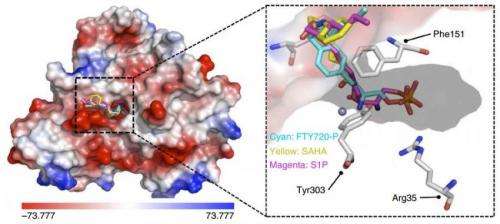May 26, 2014 report
Researchers find MS drug erases painful memories in mice

(Medical Xpress)—A team of researchers working at Virginia Commonwealth University in the U.S. has found that giving fingolimod, a drug normally used to treat Multiple Sclerosis (MS) in people, to mice, caused them to lose memories they held of a recent painful event. In their paper published in Nature Neuroscience, the researchers describe their experiments and what their findings suggest for the treatment of PTSD in humans.
Scientists and other people have been interested in the idea of erasing bad memories for some time—movies have even popularized the idea as well—as a way to recover from a broken heart. Scientists are more interested in whether a drug that could erase bad memories might help people with PTSD and other psychological ailments related to traumatic experiences. In this new effort, the researchers have found that administering a drug used for one purpose, appears to allow for erasing certain types of memories in mice.
Fingolimod is a drug that is used to treat patients with MS—it helps by suppressing the immune system. In this new effort, the researchers built on prior research that found that it also can inhibit the production of the enzyme histone deacetylase—a gene expression regulator. Fingolimod is also known to be able to cross the blood-brain barrier, which suggested a possible unknown impact on the brain. Suspecting that the impact might be related to memory, the researchers trained several mice to fear a cage—once inside an electric charge was applied to its floor. Mice trained in such a way come to exhibit clear signs of fear when put in the same cage again. Such mice can be untrained as well, by putting them in the cage over and over again without a charge, until they "forget" about the earlier trauma. In their experiment, the researchers administered fingolimod to mice that had been trained to fear the cage, and then put them through the untraining program. The researchers report that the mice given the drug tended to forget their fear of the cage faster than those that had not been treated.
This finding suggests, of course, that the presence of fingolimod in the brain can alter memories. It's not known if the drug would cause the same impact in humans, but future research will be conducted to learn more about how the drug causes memory loss and to discern if it might be useful in the treatment of PTSD.
More information: Active, phosphorylated fingolimod inhibits histone deacetylases and facilitates fear extinction memory, Nature Neuroscience (2014) DOI: 10.1038/nn.3728
Abstract
FTY720 (fingolimod), an FDA-approved drug for treatment of multiple sclerosis, has beneficial effects in the CNS that are not yet well understood, independent of its effects on immune cell trafficking. We show that FTY720 enters the nucleus, where it is phosphorylated by sphingosine kinase 2 (SphK2), and that nuclear FTY720-P binds and inhibits class I histone deacetylases (HDACs), enhancing specific histone acetylations. FTY720 is also phosphorylated in mice and accumulates in the brain, including the hippocampus, inhibits HDACs and enhances histone acetylation and gene expression programs associated with memory and learning, and rescues memory deficits independently of its immunosuppressive actions. Sphk2−/− mice have lower levels of hippocampal sphingosine-1-phosphate, an endogenous HDAC inhibitor, and reduced histone acetylation, and display deficits in spatial memory and impaired contextual fear extinction. Thus, sphingosine-1-phosphate and SphK2 play specific roles in memory functions and FTY720 may be a useful adjuvant therapy to facilitate extinction of aversive memories.
© 2014 Phys.org




















